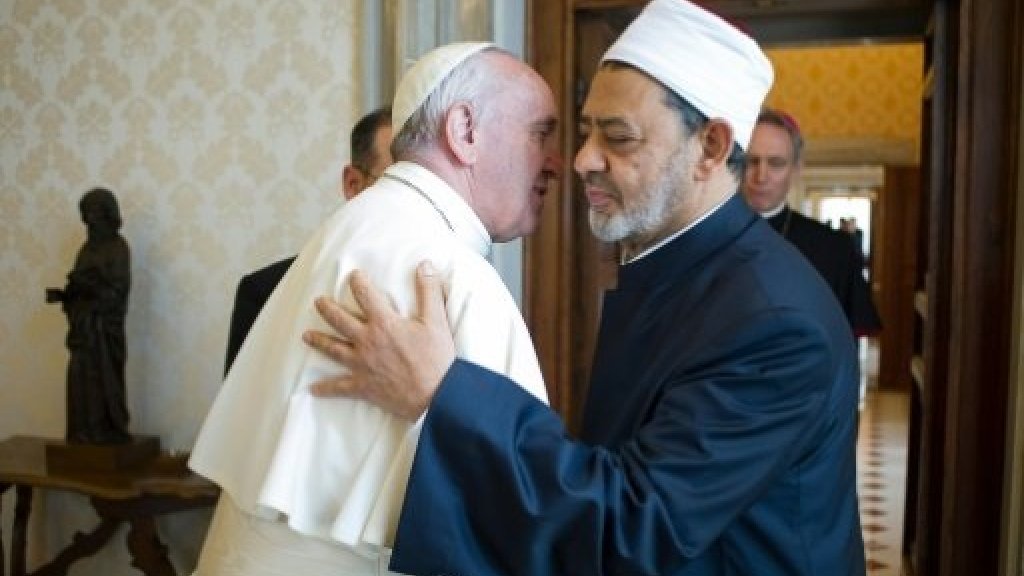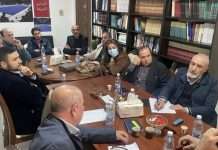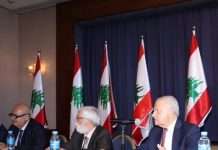On the importance of relations with Vatican, other religions
Abdulrahman al-Rashed/Asharq Al Awsat/April 30/17
The Pope’s visit to Egypt was preceded by a critical and hostile campaign. People affiliated with political groups, like the Muslim Brotherhood, are behind these campaigns which were aided by ISIS attacks on two Coptic churches earlier this month. The Pope insisted on visiting Egypt as scheduled despite all threats. Meanwhile, Al-Azhar sheikh also defied threats made against him and against his institution and publicly received his guest. Actually, the message which extremists want to send through this hateful campaign and through explosions is not directed against the Pope or against Egypt’s Copts but against the Egyptian authority and Arab governments which support it.
The underlying message the extremists seek to convey is that they are the decision-makers and will confront any foreign relations with entities that are opposed to them. During the current times of religion-based tensions, the world will benefit if people who call for co-existence rather than bigotry dominate the arena. We need people who spread the spirit of tolerance in places where there are tensions or possibilities for conflicts, like in France whose majority is a Christian Catholics and where there is a large Muslim community.
Muslim Brotherhood members who are criticizing the pope’s visit used to brag that they are civilized people who believe in co-existence with the Christian West. During closed-door meetings, they used to clear themselves from what they described as “underdeveloped” Gulf governments that restrain the followers of other religions. When the Muslim Brotherhood government collapsed, they opted for politically sabotaging others and so they launched hostile campaigns against Al-Azhar and Copts in Egypt, and their followers stirred up an uproar over the Pope’s visit.
Global religious forums
Some may wonder why we should care about dealing with global religious forums. Communicating with the Vatican and other major religious institutions in the world has, for decades, been an important part of the continuous and permanent relation among nations. The aims behind this policy is to organize relations and combat hatred against other religions. Major religions, like Islam, Christianity and Hinduism, need to organize relations among their followers as they are present in almost all countries. During the current times of religion-based tensions, the world will benefit if people who call for co-existence rather than bigotry dominate the arena.
We need people who spread the spirit of tolerance in places where there are tensions or possibilities for conflicts, like in France whose majority is a Christian Catholics and where there is a large Muslim community. The Pope is thus a religious figure of great significance as he influences his followers and to end national and religious extremism which advocates racial supremacy and political divisions. There are more than 8 million Copts in Egypt and they were never a target before religious extremism emerged. They were never a target during the reign of the monarchy or during the presidential terms of Gamal Abdelnasser and Anwar al-Sadat but they became one after extremist ideologies surfaced.
Those who condemn relations with the Vatican or think it’s recent or criticize Muslim clerics who support such cooperation are in fact ignorant, if not hypocrites and instigators. These relations have always existed and even Saudi Arabia has good relations with the Pope of Rome. King Faisal, may he rest in peace, who politically revived the Muslim league set the foundations for a relation based on respect. When he received the cardinals in Riyadh, they handed him a letter from the Pope.The pope said he and the Ecumenical council appreciate King Faisal who is the “man with the major influence in the Arab and Muslim world.”
In 1974, the King dispatched then-Minister of Justice Sheikh Mohammed al-Harkan and a delegation of Saudi clerics to visit Pope Paul VI and communicate with the Vatican. However, this communication must not only be with Christians in the West as there are other influential religions, like Hinduism, Buddhism and others, whose interests intersect with Arabs and Muslims. We must not let them be victims of their perceptions about Islam that is linked to ISIS and politicized Islamic groups.
العلاقة مع الفاتيكان وبقية الأديان
عبد الرحمن الراشد/الشرق الأوسط/30 نيسان/17
استبقت زيارة بابا الفاتيكان إلى مصر حملة عدائية ناقدة، يقف خلفها منتسبون لحركات سياسية، مثل «الإخوان المسلمين»، دعمتها هجمات من «داعش» بتفجير استهدف كنيستين قبطيتين. رغم التهديدات أصر البابا على القيام بزيارته في موعدها المعلن، كما تحدى شيخ الأزهر التهديدات ضد شخصه، ومؤسسته، واستقبل ضيفه علانية. في الحقيقة رسالة المتطرفين من وراء حملات البغضاء، والتفجير، ليست موجهة ضد البابا، ولا ضد الأقباط المصريين، بل ضد السلطة المصرية، والحكومات العربية التي في صفها. رسالة المتطرفين تقول، إنهم أصحاب القرار، وسيواجهون أي علاقة خارجية مع خصومهم.
«الإخوان المسلمون» الذين ينتقدون زيارة البابا، كانوا في السابق يفاخرون بأنهم حضاريون يؤمنون بالتعايش مع الغرب المسيحي، ويتبرأون في الندوات المغلقة ممن يصفونها بالحكومات الخليجية المتخلفة التي تضيّق على أتباع الديانات الأخرى. وعندما سقطت حكومتهم، حكومة مرسي، انتقلوا إلى التخريب السياسي، بشن حملات معادية استهدفت الأزهر الإسلامي والأقباط في مصر. وأقام أنصارهم الدنيا ضد زيارة البابا.
وقد يتساءل البعض لماذا نهتم بالتعامل مع المحافل الدينية العالمية؟
التواصل مع الفاتيكان، وغيرها من المؤسسات الدينية الكبرى في العالم، هو جزء مهم من العلاقات المستمرة والدائمة بين الأمم عبر العصور، أهدافه تنظيم العلاقة، ومكافحة الكراهية، وليس الهدف اقناع كل فريق بدين الآخر. ففي العالم تحتاج الأديان الكبرى الى ترتيب العلاقات بين اتباعها، مثل الإسلام والمسيحية والهندوسية، التي يكاد لا يخلو بلد في العالم من اتباعها. ومن مصلحة العالم في هذا الزمن المتوتر دينياً أن يتسيّد الساحة دعاة التعايش لا دعاة الكراهية، نابشو القبور والحروب والتاريخ. نحتاج إلى من يبث روح التسامح حيث يوجد توتر أو خطر الصدام. مثلاً، فرنسا، بلد غالبيته كاثوليكية مسيحية، وفيه أقلية مسلمة كبيرة. هنا البابا شخصية مهمة، له كلمة مؤثرة عند اتباعه لوقف التطرف القومي والديني، المنتشي بالفوقية العنصرية والفرقة السياسية. في مصر أكثر من ثمانية ملايين قبطي مصري، لم يكونوا قط محل استهداف قبل ظهور التطرف الديني، لا في العهد الملكي أو عهدي عبد الناصر أو السادات، تحولوا إلى هدف بعد ظهور التطرف الفكري والحركي المسلح. والذين يستنكرون العلاقة مع الفاتيكان ويعتبرونها طارئة، وينتقدون رجال الدين المسلمين المنخرطين فيها، هم في الواقع أشخاص جهلة، إن لم يكونوا منافقين محرضين. فلطالما كانت هناك علاقات وتعاون على مر التاريخ، حتى السعودية لها علاقة جيدة ببابا روما. فالملك فيصل، رحمه الله، الذي أحيا الرابطة الإسلامية سياسياً أسس لعلاقة مبنية على الاحترام. فقد أستقبل الكرادلة في الرياض الذين سلموه رسالة من البابا يعبر فيها عن تقديره، والمجمع المسكوني، للملك فيصل، بصفته «صاحب النفوذ الأسمى في العالم العربي والإسلامي». وبدوره أوفد الملك وزير العدل حينها، الشيخ محمد الحركان، مع وفد من رجال الدين السعوديين إلى البابا بولس السادس عام 1974 للتواصل مع الفاتيكان. وهذا التواصل لا يفترض أن يخص المسيحيين الغربيين بل إن هناك أدياناً أخرى مؤثرة، مثل الهندوسية والبوذية وغيرها التي تتقاطع مصالحها مع العرب والمسلمين، ويفترض ألا نتركهم ضحية تصوراتهم عن الإسلام المرتبط بداعش والجماعات الإسلامية المسيّسة.



















